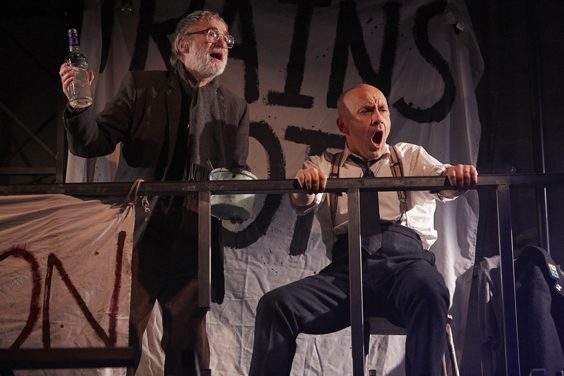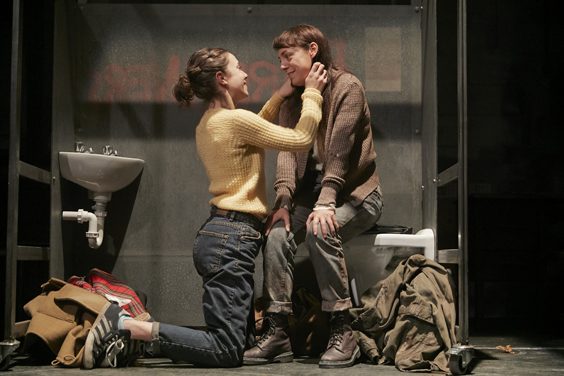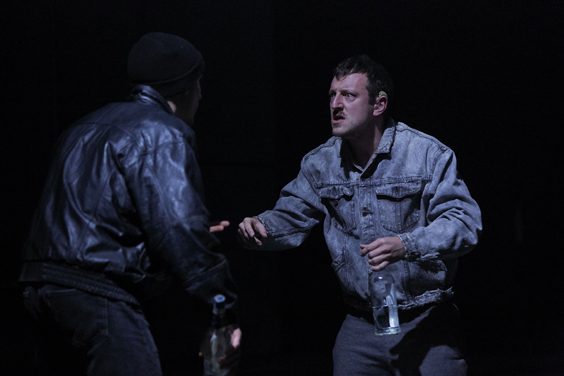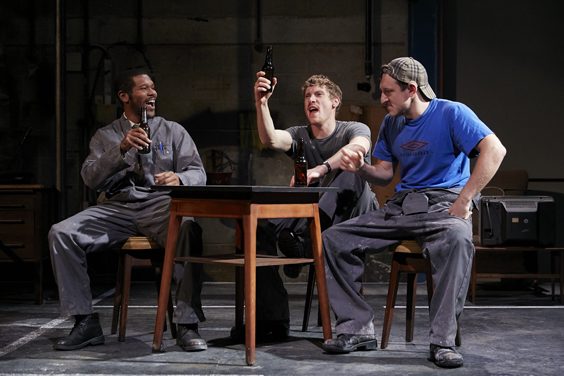Europe – Review – Leeds Playhouse Pop-Up Theatre
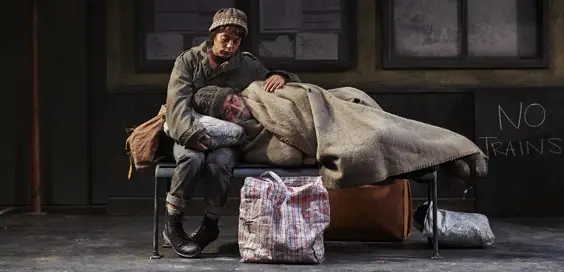
By Eve Luddington, October 2018
If you’re Brexit-weary, be assured that Europe isn’t about the B-word. It was written by David Greig in 1994 after an inter-rail trip through the newly opened Soviet countries, and during the Balkan wars. In part, it’s a comment on aspects of globalisation, in part a consideration of displaced people, be they refugees from war-torn countries or living in their own town.
The long letter-box shape of the Pop-up Theatre’s stage lends itself to the setting, a railway station fronted by a rail track. At one side a street corner; at the other, a dismal café bar. We’re in an anonymous border town somewhere in Europe.
Appropriately, Amanda Stoodley’s set is drab and functional, devoid of character. The electric-blue neon sign above the bar looks gaudily incongruous. The ‘walls’ of the waiting room and office are just chalk marks on the floor which are swept into a blur as the play progresses.
“Make connections”
In this 1990s Europe of shifting borders and blurred lines, this town has lost its status as a passport checkpoint and, along with that, its industry. The Stationmaster, Fret, is very protective of his station and clings to his timetables although the trains don’t stop here anymore.
He’s not happy to discover two strangers sleeping on the platform with their bags and baggage. His assistant, Adele, spends her working hours on the station roof watching trains thunder past in a flurry of lights and noise. Desperate for any adventure, even if imaginary, she thrills at their approach and dreams of visiting cities along their route. She’s fascinated by the travellers, who’ve actually seen these distant places. When they unfold themselves from the platform seat and cautiously open up, we discover they are father and daughter, Sava and Katia, refugees on the move. Gradually, these four characters make connections and alliances.
“Simmering tension”
Meanwhile, Adele’s husband drinks in a bar with his mates. They’re young unemployed men, raging at their lack of prospects, desperate to blame someone. Kata and Sava are the ‘perfect’ scapegoats. They’re foreigners, probably some of those despised economic migrants. ‘Are you?’ asks one character. ‘Economics is a big word,’ replies Katia. Indeed it is in the age of globalisation.
Into this potent mix comes the dodgy dealer, Morocco, who uses his freedom of movement to criss-cross Europe making a buck by fair means and foul. The contrast between his travels and the refugees’ is stark. Dapper in dress, self-assured and wealthy, he presents vodka to his resentful, unemployed mates at home. If they needed incitement to action, Morocco’s appearance provides it.
The second half brings leaves on the line and Autumn to the town as the drama intensifies. The simmering tension erupts into violence, but friendships and love emerge too.
“Compassionate viewpoint”
Europe has humour, tension, tenderness and dramatic climaxes. It shows the perilous plight of people forced out of their country by war. It presents a graphic picture of locals disappointed by poor prospects, using desperate refugees almost as objects at the receiving end of their own frustrations and pent-up emotions
I’ve read many plaudits for the play but this production didn’t live up to my expectations. It didn’t move me.
Greig wrote Europe when he was in his twenties and it feels to me as if he was still learning his craft. The town is deliberately unnamed because it symbolises so many. The characters are functionaries, presenting attitudes to meet Greig’s purpose. He doesn’t let them breathe, gain insight or change. Fret (note the name), is the exception but his anxious route to new understandings does not affect outcomes. It’s no surprise that the imaginative, open-minded Adele takes the chance to live her dream, that the frustrated, insular Berlin physicalises his anger. Some plays thrive on symbolism but I think Greig also intended his audiences to identify at an intimate, personal level and I didn’t. While it takes a compassionate viewpoint, it seems to lack heart, and subtlety.
“Warning against insularity”
James Brining’s production could have been more nuanced too, but it’s a solid effort overall – though the side seats of the auditorium seem very distant from some of the action both visually and aurally. His cast, in the second play of a brilliantly conceived company season, give life to their roles. Jo Mousley as Katia brings as much heart as possible to the toughened but vulnerable young refugee. Joseph Alessi as Fret and Tessa Parr as Adele are outstanding. It was great to see signing used too, both by a BSL interpreter and some of the cast.
So the play and its themes are communicated effectively. And for me, a strong and overriding message comes through, as troubling and relevant today as in 1994. For those who’d rather have no more mention of Brexit, look away now. Europe in the UK’s current socio-political and economic climate, is a warning against insularity. People disappointed with their situation and who feel impotent to adapt or make change, can all too easily find scapegoats for their frustrations – and they/we tend to pick on the ‘outsiders’. A memorable line directed at the audience warns, ‘…remember that we are, in our own way, also – you.’
I only wish the play had drawn me in.
images: The Other Richard
